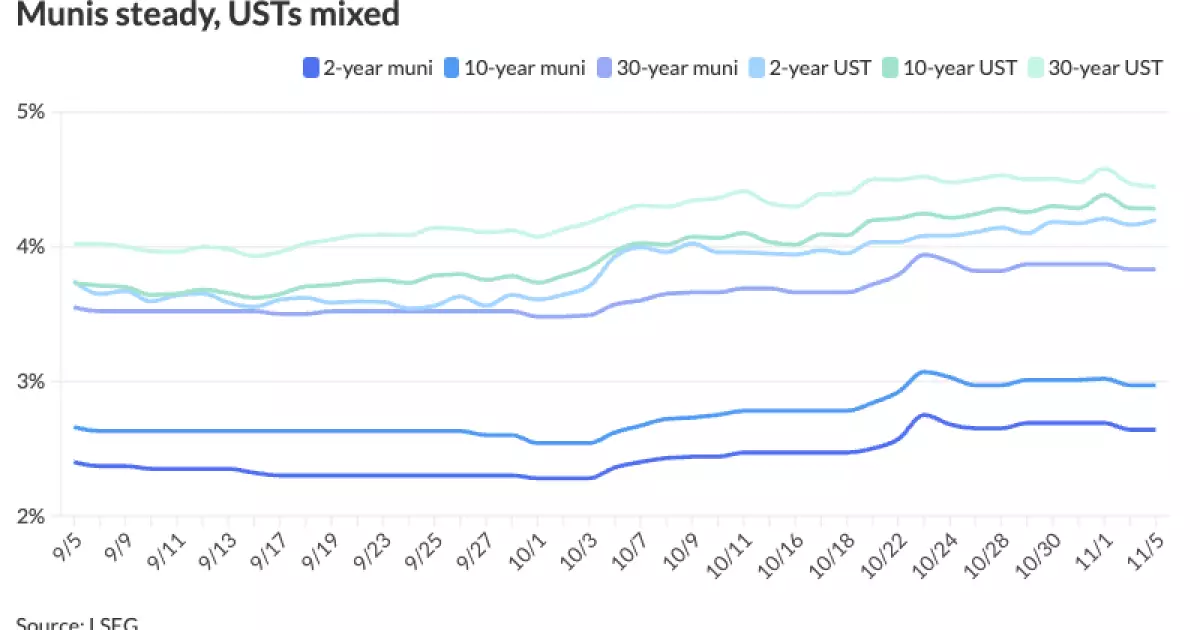The landscape of the municipal bond market is currently characterized by hesitance and a wait-and-see approach as key political developments loom. Investors are treading carefully in anticipation of the upcoming election results and the Federal Open Market Committee’s (FOMC) interest rate decision scheduled for Thursday. These events are likely to introduce volatility to the markets while influencing longer-term economic and monetary policies.
As market participants remain sidelined, the municipal bond market has shown a remarkable steadiness. Similarly, U.S. Treasuries have produced mixed outcomes, with equities showing signs of strength as the market neared the close on Tuesday. A distinct expectation exists regarding a forthcoming rate cut from the Fed, yet the same level of clarity does not apply to the electoral outcomes.
Economists like Erik Weisman from MFS Investment Management have speculated that a win for former President Trump could herald an inflationary environment, potentially impacting tax-exempt municipals. In contrast, a victory for Vice President Kamala Harris may symbolize continuity, leading to a more stable current policy backdrop. This divergence in expectations represents more than just a mere change of guard at the political level; it reveals a deep uncertainty around fiscal approaches that could reshape the investment climate for municipalities considerably.
Market Speculations and Their Implications
Recent reports highlight that betting markets assign a significant probability—48%—to a possible Republican sweep. J.P. Morgan strategists, led by Peter DeGroot, have assessed that such an outcome would challenge key priorities, such as the reduction of corporate taxes, which could dampen demand for municipal bonds. They note the different possible scenarios for this election’s results, with the likelihood of a divided Congress, which might complicate the passage of transformative legislation.
A crucial aspect of this analysis is the implications of potential tax increases under various political scenarios. The J.P. Morgan team elaborated that such tax increases could lead to a heightened demand for municipal bonds as investors seek refuge in tax-exempt opportunities. Beyond speculation, the overarching trend reveals the prevailing fear that a divided government would hinder critical decisions on extending provisions from the Tax Cuts and Jobs Act, leaving individual mandates at risk of full expiration.
The Fed’s Dilemma: Navigating Inflation and Interest Rates
The intersection of monetary policy and the political landscape forms a complex dilemma for the Federal Reserve. With inflation and interest rates creating pressing concerns, the Fed’s decisions will heavily depend on the political winds that will sway post-election. As RBC Global Asset Management’s Andrzej Skiba outlined, Trump’s proposed trade policies could further complicate this scenario, especially if tariffs lead to inflationary pressures.
A Trump victory could trigger a legislative environment unfavorable to fixed income. The 10% tariffs proposed might contribute significantly to rising inflation, making it less likely for the Fed to enact rate cuts—even if economic indicators suggest a downturn. This potential scenario embodies a perilous mix for the bond market, as inflationary indicators often dictate the Fed’s actions and strategies.
The overarching concerns surrounding national debt are top of mind for many market analysts. According to Bryce Doty from Sit Investment Associates, issues of burgeoning national debt—and the consequences that follow—are critical regardless of the election’s result. The pressures of managing federal deficits are increasingly complex, especially as allocations for defense alongside interest expenses grow.
Doty notes that while Trump’s previous policies might have yielded better outcomes for tax revenue, the persistent national debt raises questions for the Fed. The balancing act of stimulating economic growth while curbing inflation will be key to guiding future interest rate policies. This need for a middle ground suggests that upcoming federal meetings might only see minor rate adjustments unless market dynamics shift considerably.
The Constantly Shifting Landscape
As municipal bonds maintain their stability amid political uncertainty and the potential for changing rate policies, there lies an intricate web of investor expectations and macroeconomic realities. While some market participants predict that a victorious Trump administration could bring higher inflation, others lean toward a more stable and less volatile environment under a Harris presidency.
As the Fed readies for its key meetings, the stakes remain high for traders looking to navigate an unpredictable landscape shaped by both fiscal policy and the shifting tides of politics. The interest in municipal bonds must be adapted accordingly, offering unique challenges and opportunities depending on which way the political winds blow. Investors need to closely monitor the rapidly evolving situation to make informed decisions in this increasingly complex market.


Leave a Reply